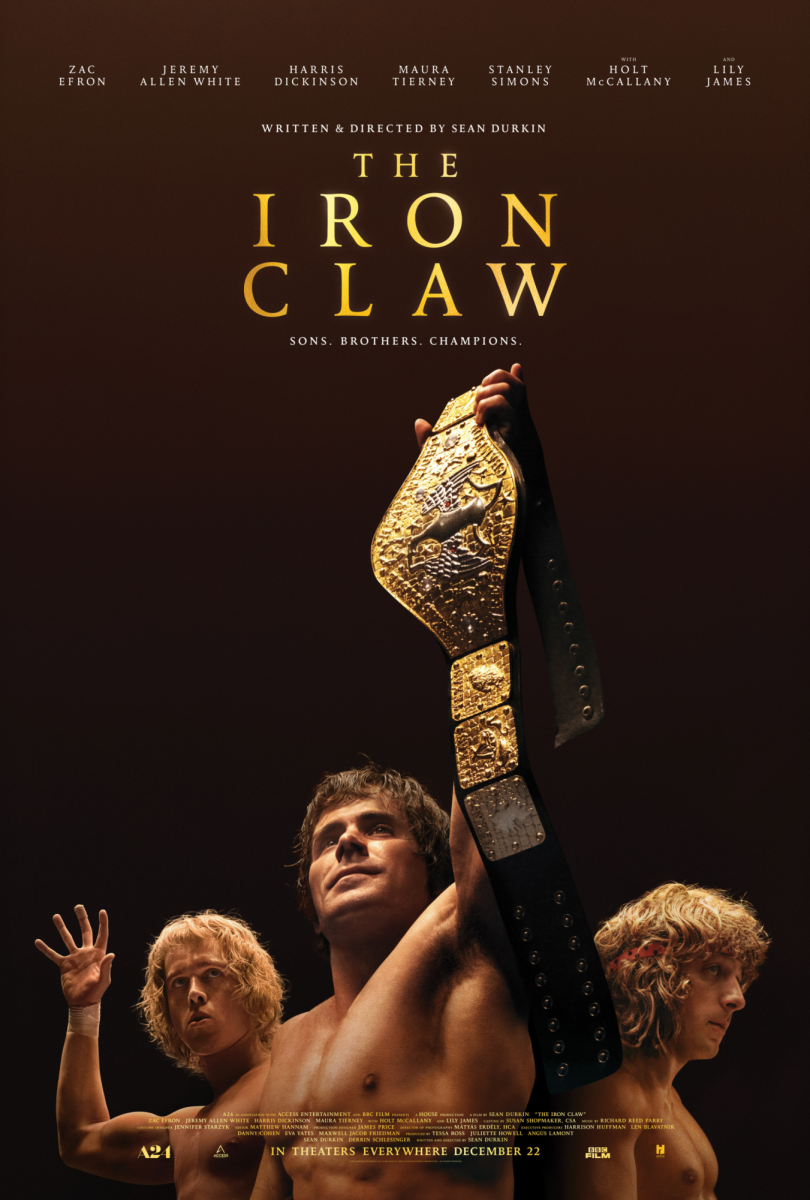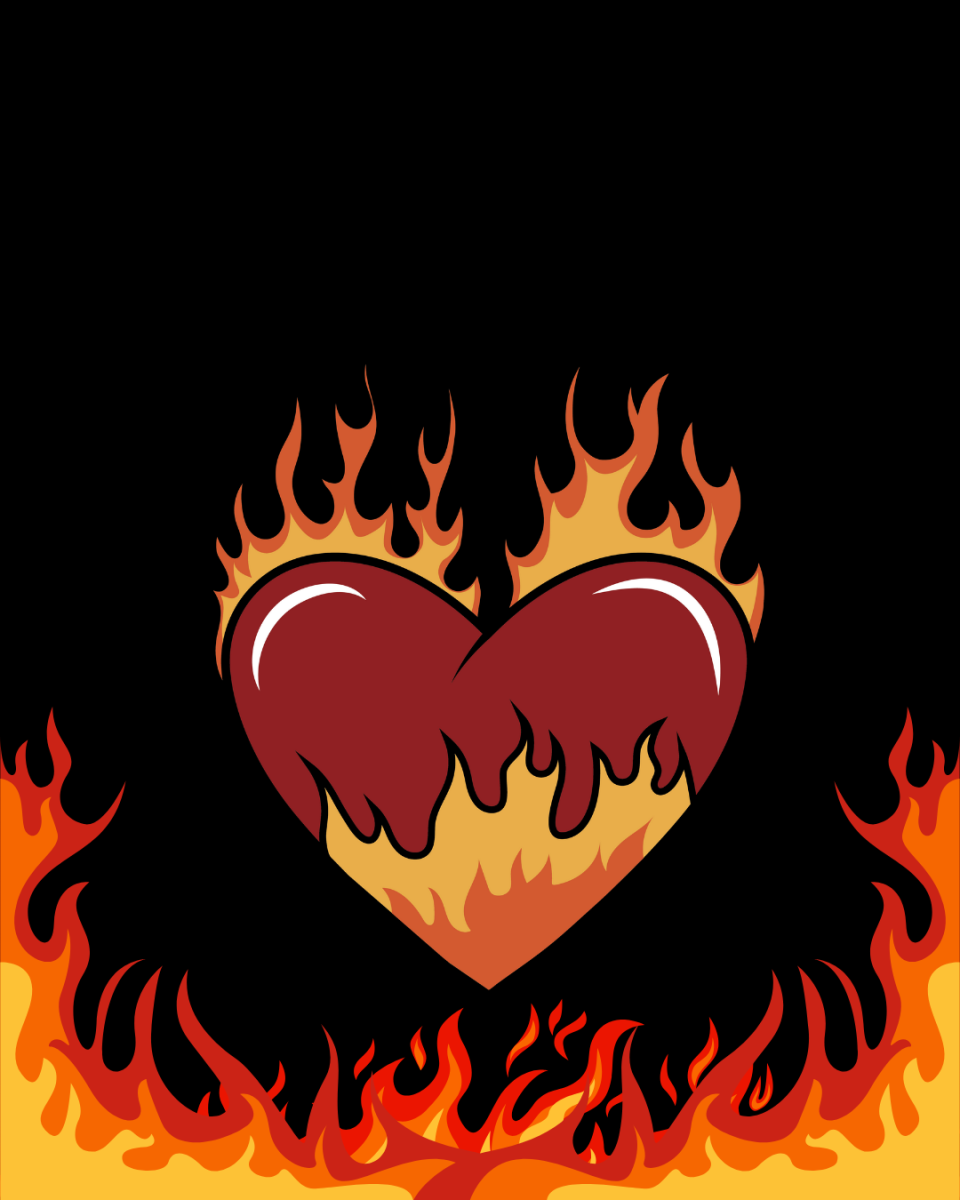Sitting in a movie theater watching the credits roll and feeling absolutely hollow is not everyone’s idea of a fun night out. Perhaps sitting in awe of a superbly crafted film is. Writer, director and producer Sean Durkin’s third feature film is intense, action-packed, and harrowingly beautiful. “The Iron Claw” is based on the unbelievable true story about the Von Erich wrestling family and their “curse.” The film is a great exhibition in filmmaking, with stellar performances and exhilarating fight scenes, but be warned: you will need tissues.
Warning: Spoilers Ahead
The Von Erichs are a family of four sons. From oldest to youngest, the Von Erich boys include Kevin, David, Kerry and Mike. Fritz Von Erich, played by Holt McCallany, the father and former wrestler, raised all of his sons to be professional wrestlers and to try and achieve what he could not: National Wrestling Alliance (NWA) World’s Heavyweight Championship. Fritz’s parenting style is perfectly exhibited in a scene where he lists his sons in order of who his favorite is and why.
The film follows the eldest son, Kevin Von Erich, played by an uber-jacked Zac Efron. Although the film will repeatedly have you asking ‘Wait — that’s the guy from “High School Musical”?’, Efron delivers an infallible, Oscar-worthy portrayal of the protagonist. Unfortunately, in one of the biggest snubs from this year’s event, he missed out on a nomination.
In “The Iron Claw,” tragedy befalls the Von Erich family and does not leave. It starts with Fritz taking his mother’s maiden name, Von Erich, which was said to have been cursed. His mother’s family suffered a history of tragedies and soon after changing the name, Jack Von Erich Jr., the actual eldest son, drowned at the age of six.
In 1984, after David Von Erich, played by Harris Dickinson, is chosen ahead of Kevin to fight for the heavyweight championship, he dies of an intestinal condition called enteritis. After David’s death, Fritz flipped a coin to decide that the third eldest son, Kerry, portrayed by Jeremy Allen White, will take his place in the fight, with Kevin missing out again.
Kerry won the fight and became the heavyweight champion, completing his father’s dream. Feeling unfulfilled with the championship he believed belonged to his brother David, a drunk Kerry went for a late-night motorcycle ride, which led to a crash that cost him his right foot.
White, who recently won an Emmy and Golden Globe for his lead performance in the television series, “The Bear,” proved his brilliance in the film medium as well. He provided a rich performance full of nuance and was one of the standouts of the film. He particularly shines in a later scene where he contemplates suicide over the phone with Kevin. White’s emotionally authentic portrayal of Kerry particularly shines in a later scene where he contemplates suicide over the phone with Kevin.
The youngest son, Mike Von Erich played Stanley Simons, dreamt of becoming a musician and started a band. His father, Fritz, disapproved of this and eventually pushed him into wrestling like the rest of his brothers. Two years after his debut, Mike injured his shoulder in a tag team match and later suffered from toxic shock syndrome during surgery. He survived but was left with permanent brain damage. His father tried to force him back into the ring, but Mike, instead, chose to take his own life.
A few years later, Kerry commits suicide as well. Kevin, now having lost all of his brothers, tackles his father, nearly choking him to death, something the audience would not have minded at this point. It was Fritz’s tyrannic parenting and pressure that led to the deaths of his sons.
The Von Erich boys all wanted to make Fritz proud even though he treated love as a commodity that is earned and lost. It’s a very delicately crafted portrayal of a father-son relationship — although taken to an extreme — and a unique representation of the duty a son feels towards his father.
The motorcycle scene was perhaps the most well-crafted in the film. Durkin, along with Cinematographer Mátyás Erdély, creates palpable anxiety with a shaky point-of-view shot of a barely lit road and an increasing sensation of speed. You just know something bad is going to happen. The scene crescendos, rising and rising until it cuts away.
This crescendo effect is mimicked in another great scene where Kevin, in an empty wrestling ring, bounces from the rope of one end of the ring to another repeatedly with increasing pace. The scene expresses Kevin’s frustration with his life, the loss of his brothers, and how, despite his roided, bulging muscles, he is powerless against the family curse.
“The Iron Claw” shows that family is a complicated thing and that grief can be hereditary. Throughout the film, Durkin expresses that grief is only a poison if you let it consume you and sometimes the hardest thing is to go on living.





